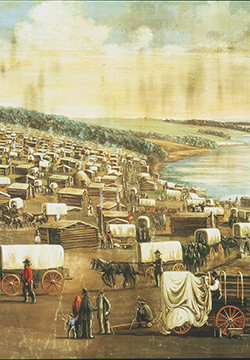June 29, 1843
Nauvoo, Illinois
Nauvoo City Ordinances: Required all strangers entering Nauvoo to give their names, former residence, and what intent they have in being in Nauvoo. Also gave authorities the right to ask whether any of these persons had recently been exposed to any contagious disease or diseases from whence they came. Prohibited citizens of Nauvoo from keeping any animal confined within the City for the purpose of "increasing the passions or ferocity of said animal" or endangering any passer-by. States that only animals such as cows, calves, sheep, goats, and harmless and inoffensive dogs may run at large in the city. Established that if any person swam or bathed in the public waters in Nauvoo and exposed themselves to public view in a state of nudity, they would be fine three dollars for the first offense and charged under the Ordinance Concerning Vagrants and Disorderly Persons for the second offense.
Sources:
Sustaining the Law: Joseph Smith's Legal Encounters, Gordon A. Madsen, Jeffrey N. Walker, and John W. Welch,
Tag:

Read peer-reviewed articles about Joseph Smith and other Church history topics from BYU Studies. Visit byustudies.byu.edu.